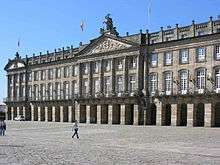Xunta de Galicia
The Xunta de Galicia (Galician pronunciation: [ˈʃuntɐ ðɪ ɣaˈliθjɐ]; "Regional Government of Galicia")[1] is the collective decision-making body of the government of the autonomous community of Galicia, composed of the President, the Vice-President(s) and the specialized ministers (Conselleiros).
| Conjoined institutions overview | |
|---|---|
| Formed | 1981 |
| Jurisdiction | Galicia |
| Headquarters | Santiago de Compostela |
| Minister responsible | |
| Website | xunta.gal |
The Xunta has at its disposal a vast bureaucratic organization based at Santiago de Compostela, the galician government capital. The Xunta de Galicia has delegations in the four capital cities of Galicia: A Coruña, Pontevedra, Ourense and Lugo.
Legal basis
Article 16, Section 2 of the Galician Statute of Autonomy states that
The Vice presidents and Ministers shall be appointed and dismissed by the President.
History
The Xunta de Galicia finds its origins in the Xunta of the Kingdom of Galicia active between 1528 and 1833. The Xunta was Galicia's representation to the central Spanish monarchy. The Xunta was composed by representatives from the cities (dioceses) of Santiago de Compostela, Lugo, Betanzos, A Coruña, Mondoñedo, Ourense and Tui. But at that time the Xunta did not hold real power; it was a consultative body only.
During the Peninsular War, started in 1808, the Xunta Suprema de Galicia directed the war against the French invaders and maintained the public order in Galician territory. This Xunta Suprema was in charge of military, legislative issues, and international relations. It was the first time that the Xunta had real autonomy, as the Spanish control weakened. This situation lasted until the French invaders were eventually expelled from the Iberian Peninsula and Ferdinand VII of Spain gradually recovered control over former territories (1813–1814).
In 1833 the Xunta was dismantled following the provincial division engaged in Spain by minister Javier de Burgos, under the regency of Maria Christina of the Two Sicilies. In this way, Galicia was separated into four provinces, each one managed by a Provincial Council.
Yet, in 1843 the Xunta Central de Galicia was created and presided over by Xosé Maria Suances. In 1846 commander Miguel Solís initiated a military uprising in Lugo. He put an end to the Provincial Councils and created the Xunta Superior do Goberno de Galicia, presided over by Pio Rodríguez Terrazo. This movement attempted to re-unify Galicia and called for Galicia's self-rule. Solís was eventually defeated at the Battle of Cacheiras (23 April 1846) and the so-called Martyrs of Carral were executed on 27 April.
Prospects for Galician self-government and possible restoration of a Xunta came close while the Galician Statute of Autonomy of 1936 was being discussed, at the time of the Spanish Second Republic (1931–1939). However, the Spanish Civil War (1936–1939) and subsequent Francoist Spain (1939–1977) halted the process. There was a temporary Galician government in exile, presided by Castelao, although this was not called Xunta but Consello da Galiza (Council of Galicia).
The process of devolution initiated by the passing of the Spanish Constitution in 1978 allowed for the establishment of a new Xunta, on 16 March 1978. The Galician Statute of Autonomy (1981), came to ratify the Xunta and Galicia's self-government.
Current cabinet
The consellerías are the different departments, or ministries, of the Xunta de Galicia. They are the responsibility of the conselleiros (masculine) or conselleiras (feminine). The conselleiros and conselleiras form the actual cabinet[2] of the government, close to the President. The list of current consellerías and their respective heads is as:
- President: Alberto Núñez Feijóo (PPdeG)
- Vice- President and Ministry of the Presidency, Civil Service and Justice: Alfonso Rueda Valenzuela (PPdeG)
- Ministry of Finance: Valeriano Martínez García (PPdeG)
- Ministry of Environment and Territory: Beatriz Mato Otero (PPdeG)
- Ministry of Infrastructures and Housing: Ethel María Vázquez Mourelle (PPdeG)
- Ministry of Economy, Employment and Industry: Francisco Conde López (PPdeG)
- Ministry of Culture, Education and University Planning: Román Rodríguez González (PPdeG)
- Ministry of Health: Jesús Vázquez Almuíña (PPdeG)
- Ministry of Social Politics: José Manuel Rey Varela (PPdeG)
- Ministry of Rural Affairs: Ángeles Vázquez Mejuto (PPdeG)
- Ministry of the Sea: Rosa Quintana Carballo (PPdeG)
Location
- Edificios Administrativos San Caetano
San Caetano, s/n
15704 - Santiago de Compostela (A Coruña). - Pazo de Raxoi
Praza do Obradoiro
15705 - Santiago de Compostela (A Coruña). - Sede Provincial da Xunta de Galicia na Coruña
Vicente Ferrer, 2
15008 - A Coruña (A Coruña). - Sede Provincial da Xunta de Galicia en Pontevedra
Fernández Ladreda, 43
36003 - Pontevedra (Pontevedra). - Sede Provincial da Xunta de Galicia en Ourense
Habana, 79
32004 - Ourense (Ourense). - Sede Provincial da Xunta de Galicia en Lugo
Ronda da Muralla, 70
27001 - Lugo (Lugo). - Sede local da Xunta de Galicia en Vigo
Concepción Arenal, 8
36201 - Vigo (Pontevedra). - Sede local da Xunta de Galicia en Ferrol
Praza de España, 2
15403 - Ferrol (A Coruña).
See also
- Reintegrationism
- Galician Statute of Autonomy of 1981
- Parliament of Galicia
- President of Galicia
- Anxo Quintana
- Emilio Pérez Touriño
References
- "Mariano Rajoy offers Regional Government of Galicia "all the assistance it may need" in fighting wildfires". La Moncloa. Government of Spain. 16 October 2017.
- Galicia, Xunta de (2009-02-10). "Conselleiros/as do Goberno Galego". Xunta de Galicia (in Galician). Retrieved 2018-06-26.
External links
- Xunta de Galicia's official web (in Galician and Spanish)
- The middle-age origins of the Xunta de Galicia (in Galician)
